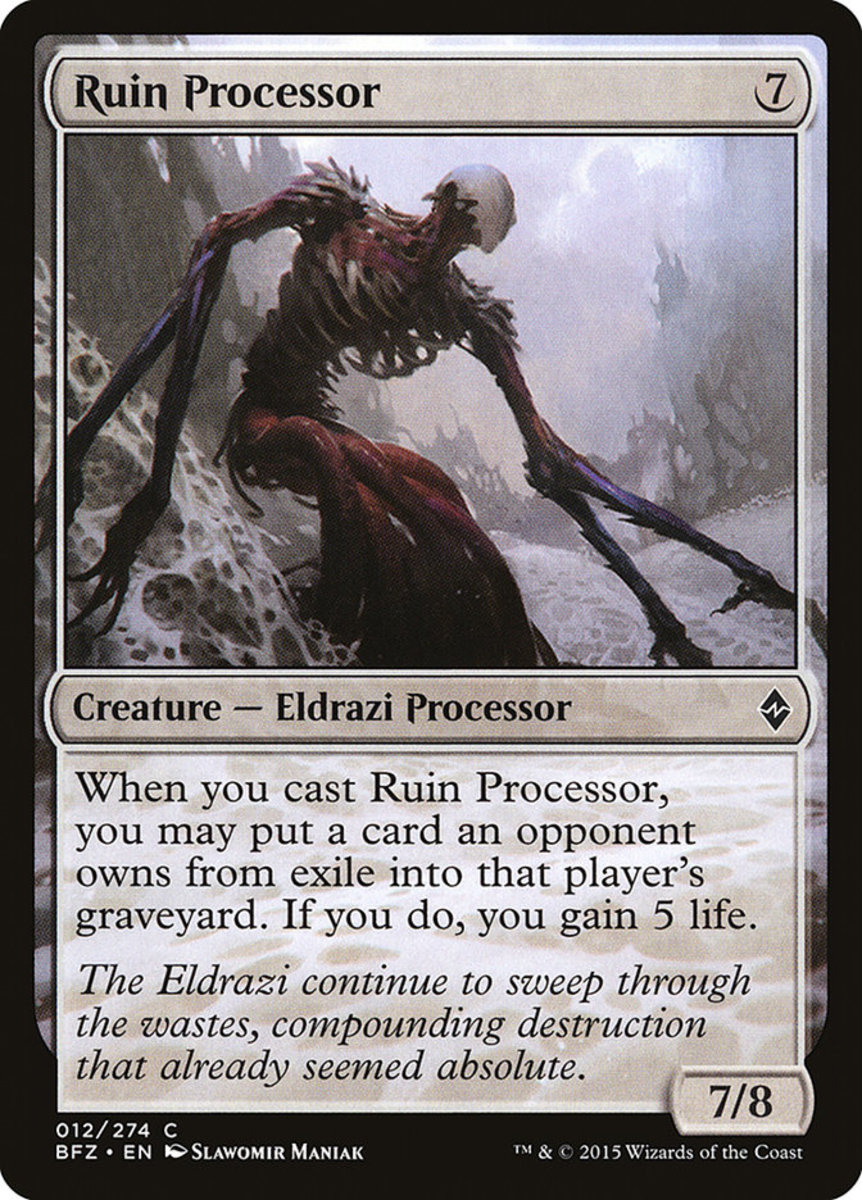How to Play Texas Hold'em
Please note that this hub does not in any way discuss putting money into a poker game, but simply the rules of the game and some basic strategies, including recommended reading resources for those who are interested in the game of poker. Hubpages does not allow hubs that discuss gambling and I ask that you please be respectful of their policies in your comments on this hub. If not, I'll hide the capsule!
Ultimately, poker is a game of skill, and many professionals feel that the game of Texas Hold'em is the only pure game left. It is Texas Hold'em that is played at the main event for the World Series of Poker and it is Hold'em that has made poker a popular game again. Even better, the game is simply and easy to learn and I have yet to experience a "variation" on the game (such as Omaha is a "variation" of seven-card stud).
Even better, finding a "free" game is easy to do in the United States, as many bars have Hold'em games that are easy to find and free to buy in!
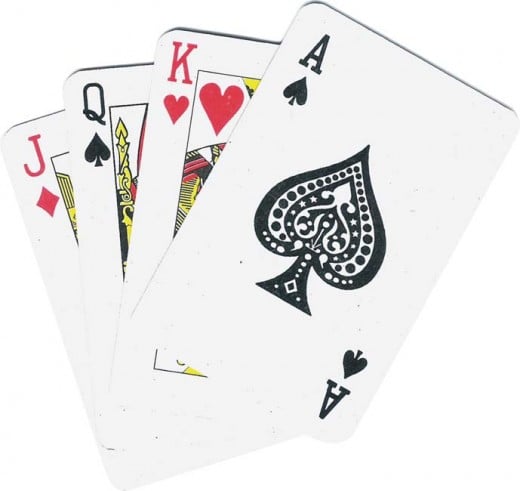
Understanding Hold'em
Texas Hold'em is a game of poker that has become very popular recently. It is the game played at the main event of the World Series of Poker and a game can commonly be found in many bars across the United States. This was the game featured in the movie Rounders, starring Matt Damon.
Poker (in general) is played with a standard 52-card deck. The four suites are Spades, Hearts, Diamonds and Clubs, with face values of Ace through King. In poker, aces are usually high, though there are always "house rules" to consider.
Hold'em can be played with any number of players, though a table usually consists of between 2 and 8 players.
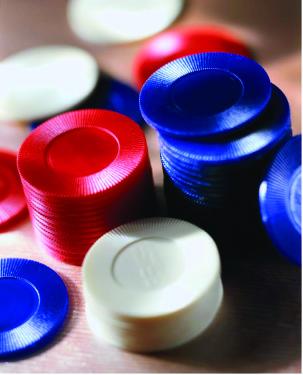
Paying the Blinds
When a player is sitting "in the blinds" this means that he or she must place a pre-determined number of chips (or points) into the pot. This helps in building the amount of points in the pot and sets the minimum bet for the hand.
Blinds are placed into the pot by the two players sitting to the left of the dealer. Immediately to the left of the dealer is the small blind and to their left is the big blind. The small blind is half of the minimum bet (the big blind).
During tournament play, the amount of the blinds increases at pre-determined intervals. In my experience the intervals are usually between fifteen minutes (this is very quick play!) and half an hour. The blinds increase in order to speed up play -- without this increase some players would be able to stay in the game, passing chips back and forth, for a very long time!
The Poker Face -- This video does not feature Phil Ivey!
Terms in Texas Hold'em Poker
If you are unfamiliar with Texas Hold'em or with poker in general, you will need to begin by understanding some of the terms that will be used throughout this hub.
Big Blind -- The minimum bet in a hand; the player sitting two places to the left of the dealer
Small Blind -- Half the big blind; the player sitting immediately to the left of the dealer
Check -- To pass action to the player to your left. Checking means taking no action and can only be done if there is no previous bet on the table
Bet -- To place a number of chips into the pot, equal to at least the big blind for that hand
Fold -- To throw your cards away, normally only done if there was a previous bet in the hand. This prevents you from having to put any more points into the pot
Pot -- The accumulated points during a hand that the winner of the hand will receive
Burn -- The card the dealer throws away between rounds of dealing
Muck -- The dead cards in the hand
Flop -- The first three community cards, dealt face up
Turn -- The fourth community card, dealt face up; also known as fourth street
River -- The fifth community card, dealt face up; Also known as fifth street
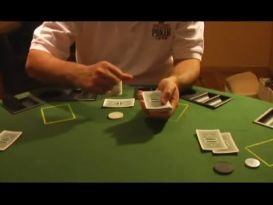
How to Deal Texas Hold'em Poker
Once the blinds have been put into the pot, the cards are shuffled, and the dealing begins. Each player is dealt two cards face down (their pocket cards). These cards are private and are kept only to the player who has been dealt them.
Once each player has been dealt two cards, the betting begins. The player to the left of the big blind begins the process. He has three choices: Fold the hand, call the big blind (bet), or raise. If he decides to raise this player must at a minimum double the big blind.
Each player around the table is given an option, right to the small blind (who has the option to fold, call or raise just as does every other player at the table). The big blind also gets an option, though his option is slightly different. If there have been no raises at all at the table, he can either check or raise the big blind (which will cause the entire process to go back around the table again).
Once the betting is completed (and each active player has placed the same amount into the pot), the dealing continues.
The dealer will first burn a card. This card is placed face down on the table as part of the muck.The burned car is not viewed by any of the players and is considered a "dead" card. It will not be used in the hand.
Three cards are dealt face up in the middle of the table. These are community cards, and each of the players at the table as an equal opportunity to use them in order to make the best five-card hand. These cards are known as the flop.
Another round of betting follows, beginning with the player in the small blind. Betting proceeds around the table before the next card is dealt.
The dealer will once again burn a card, placing it into the muck. Now a fourth card is dealt face up on the table, again for use by all players. This card is known as fourth street or the turn.
Betting proceeds in the same way as it did following the flop, beginning with the small blind and progressing around the table with each player, checking, betting or calling a previous bet.
Finally, the dealer will burn a third card and then place a fifth card face up on the table (The River). Betting once again proceeds around the table in the same way, and the hand is completed.
The video below shows how a hand of Texas Hold'em is dealt. Note the placement of the blinds in the video.
The Hold'em Deal
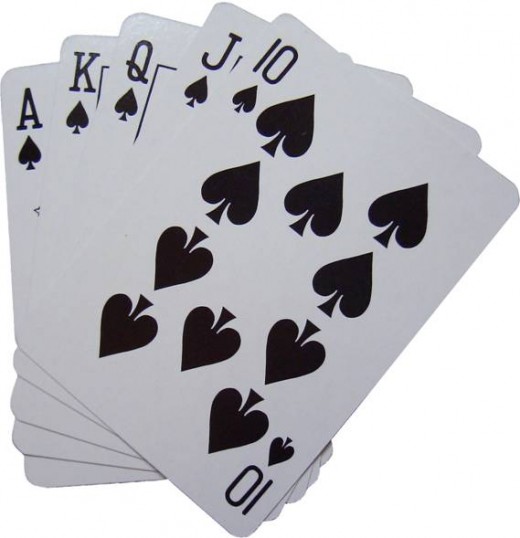
Hands in Texas Hold'em Poker
I have listed the hands below in the order of strength, from weakest to strongest. Deuces are low and aces are high, so a pair of fours will beat a pair of deuces but a pair of aces will beat a pair of kings.
In order, the hands on poker are:
High Card -- If no player at the table has "made their hand," the highest card still in the hand will win the pot
Pair -- Two cards of the same value (example: 2 twos)
Two Pair -- Simple: having two cards of the same value - twice (example: 2 twos and 2 fives)
Set -- Three cards of the same value. Also known as trips (example: 3 sixes)
Straight -- Five cards in sequential order (example: 4,5,6,7,8) The higher the straight the better it is!
Flush -- Five cards of the same suit (example: five spades)
Full House -- Two of a kind and three of a kind. Also known as a boat or full boat (example: 2 twos and 3 fives)
Four of a Kind -- Four cards of the same value (example: 4 Jacks)
Straight Flush -- Five cards of the same suit in sequential order (example: 4s, 5s, 6s, 7s, 8s) The higher the straight the better it is!
Royal Flush -- The cards from 10 - A in the same suit (example: 10s, Js, Qs, Ks, As)
Learning to Play Texas Hold'em
If you are interested in learning to play Texas Hold'em, you can get the basics from articles on the internet such as this one, or by reading some of the books that I have recommended below. However, there is never a better teacher than experience! I learned the basics (as defined here) from my husband and learned the nuances of the game by playing it. It is an unendingly fascinating and exciting game for most players!
If you are serious about learning to play Texas Hold'em, stay away from the internet sites. No, I'm not kidding. These sites aren't going to make you the next phenom (Jamie Gold anybody?). In most cases, play on the internet suffers because of the nature of the players. You need face to face contact with people who are serious about the game. Anyone who has ever played against a pro (and I have) will understand what I mean.
You will be very likely able to find a local game at a bar. These games have no buy-in (free) and often offer a pay out. This is a strategy for the bar to make more revenue in drinks (and some players will spend more in alcohol than the payout at the end of the game!). If you are lucky enough to have a league in your area, look into joining.Top prizes for many of these leagues is a buy in to the World Series of Poker or the World Poker Tour!
A Bit of Mood Music
Chris Ferguson with some Cards
Learning from the Pros
Before I conclude, I would like to highlight some wonderful professional players who have enhanced the game and who are genuinely great people. My husband's best friend is a semi-professional player who has met many of these great players!
Many professionals also run poker boot camps where you can learn strategies for the game. Most are very costly and I have not screened any of them, so proceed at your own risk!
Phil Hellmuth is the original "poker brat." He's obnoxious and he narrates the games. And he's a giant. But a great guy who has published books on poker strategy that you should consider checking out!
Phil Ivey is frightening. Just watch him in action. I don't think I could stand to be at a table with him, just that look he gives a player he's playing against!
Doyle Brunson is the Texas Dolly. One of the greatest players of all time and he has done a lot for this sport!
Chris Ferguson is one of the most well-rounded individuals in the poker world. Called "Jesus," he is a swing dancer and can do some great things with cards! Check out the video to the right!
Daniel Negreanu is my personal favorite. He's a great all-round guy and an awesome poker player!
Johnny Chan can be forgiven now for Jamie Gold. He was strongly featured in the movie Rounders which can be purchased above.
Mike Matusow is "the Mouth," the loudest and most obnoxious player in all of pokerdom, but he is a great guy and intersting to watch!
I am not responsible for the contents of the pages linked below, but do verify that at the time of posting, the links do not lead to sites that promote gambling or illegal activity of any form whatsoever. I am not responsible for changes made to these sites. If you encounter a problem, please contact me so that I can correct it!
Please bear in mind that most professional poker players do not consider playing this game to be gambling, and I agree with them. The truth is that this is a game of skill, which does, as many do, involve a certain element of chance. A skilled poker player is similar to a skilled stock-broker: they take risks, but they are aware of the risks and know what they are doing!
Texas Hold'em Resources and Interesting Sites
- Chris Ferguson on Wikipedia
Chris "Jesus" Ferguson is one of the most interesting poker players today. He is multi-talented, a swing dancer who also does some amazing card tricks! This is his page on Wikipedia. - WPT | World Poker Tour Home
The World Poker Tour official site, where you can get information about joining in the tour. A friend of ours has won his way into this tournament on more than one occasion and so this is very possible to do! - World Series of Poker - Official Tournament Coverage and Results
I try to watch the World Series of Poker every year. Stars are made and lost in this arena and this site will give you information about the Series and how to register. The World Series is a cash tournament! - Doyle Brunson on Wikipedia
Doyle Brunson might be the best poker player alive. He has a long history with the game but is gradually fading into the background because the internet players have taken over the game. This is his page on Wikipedia. - Phil Hellmuth on Wikipedia
Phil Hellmuth is arguably one of the greatest players in Texas Hold'em. He is known as the Poker Brat and does have a tendency to give a running commentary on the game. This is his page on Wikipedia. - Mike Matusow on Wikipedia
Known as "The Mouth," Mike Matusow is known for his temper tantrums at the poker table, but is still a great and very talented player! This is his page on Wikipedia. - Johnny Chan on Wikipedia
Johnny Chan is one of the most famous players in the business! One of his games was heavily featured in the movie Rounders and he is very well known in the poker community! - Daniel Negreanu on Wikipedia
I knew I loved this guy for a reason! He doesn't have a site that is a plug for another poker site (though I understand he has his own poker site which didn't come up in my search). An incredible, charitable and amusing player! - Phil Ivey on Wikipedia
Phil Ivey is one of the most intimidating players in the game. He has a way of staring down a player and making them shake in their boots! Any list of the top ten players of all time needs to have Phil Ivey listed on it! - World Tavern Poker -– The #1 Bar Poker League
I mentioned World Tavern Poker several times in the above hub, and I thought I would give readers an opportunity to find a local league near them. This is an excellent program and I recommend all beginners get involved. Totally free!



